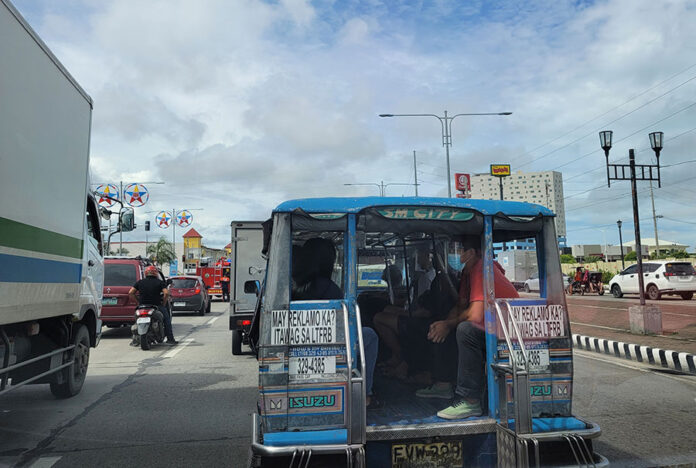A 4-kilometer jeepney ride around Iloilo City will cost a passenger ₱ 15 if the provisional fare hike sought by transport groups is granted by the Land Transportation Franchising and Regulatory Board (LTFRB).
Boyet Parcon, president of the Iloilo City Loop Alliance of Jeepney Operators and Drivers Associations (ICLAJODA), said the ₱ 15 minimum fare for the first four kilometers is the only way for drivers to survive if the 1-meter physical distancing rule is imposed by the Department of Transportation through the Land Transportation Office (LTO) and LTFRB.
The rule is being imposed on public utility vehicles to curb the spread of COVID-19.
The current minimum fare is ₱ 9 for the first four kilometers and ₱ 1.50 for every successive kilometer.
Given the dimensions of public utility jeepneys, Parcon said the 1-meter rule will only allow seven passengers per trip.
“If a driver has 8 trips for a day, they will earn ₱ 1,008 which is not enough for the ₱ 400 rental and ₱ 500 for fuel. The driver also must eat. If that’s the case, they have no more money to take home,” Parcon said.
While the temporary fare hike is beneficial to drivers and operators, it will certainly cause a domino effect on passengers and businesses.
“It will cascade to the passengers and businesses who will shell out extra money for their fares amid the economic crunch caused by the pandemic,” he added.
But there is an alternative that will avoid paying extra in public transportation.
Parcon said if the government allows them to operate at 50 percent of their passenger capacity, they will not ask for the ₱ 15 minimum fare.
“At 50 percent capacity, we can survive a day’s trip and passengers will not be forced to pay extra. We have been following health protocols to ensure the safety of our passengers. We just hope the LTFRB can decide soon,” he added.
For now, the LTO and LTFRB decided to hold the implementation of the 1-meter rule until the fare hike petition is addressed.
LTO-6 regional director Eric Lennard Tabaldo said they will await LTFRB’s decision before they apprehend drivers who violate the rule.
Meanwhile, Iloilo City Councilor Rommel Duron also urged the LTFRB through a resolution to quickly act on the fare hike plea of the transport sector to address the economic effects of the pandemic.
Duron, chairman of the committee on transportation at the Iloilo City Council, said he finds the ₱ 15 fare reasonable in the light of the 1-meter rule.
“This is the reason that the resolution was unanimously passed by the council. I also coordinated with LTFRB regional director Richard Osmeña on this matter,” he added.
Osmeña said they are now consolidating all fare hike petitions from other areas of the country so that the board can come up with a unified decision.
TESTING
Meanwhile, Parcon said he cannot force their members to undergo COVID-19 testing as part of the city’s surveillance efforts.
Earlier, Iloilo City COVID-19 task force spokesperson Jeck Conlu urged public utility jeepney drivers to undergo testing so they can keep track of COVID infections in the city.
Conlu cited their latest data that nine drivers were infected following contact tracing efforts.
While he has no problem with the testing, Parcon said some of their members are resistant because it will mean taking them off the streets while waiting for the test results.
Under current protocols, a person who undergoes COVID-19 testing must quarantine until he or she is cleared.
Parcon said while the local government offered to provide food for the drivers who undergo testing, their concern is their families.
“What will happen to our families if we are isolated? The assistance will only be to the driver but there is no assurance on the part of our families,” he added.
But Conlu had assured that the city government will help the drivers and their families if they participate in the random testing.
Parcon also said that none of their members were infected and that traditional jeepneys are safer compared to closed and air-conditioned types such as taxis and modern jeepneys.
“We have barriers and we disinfect as well. And jeepneys are open which minimizes the spread of the virus unlike air-conditioned units,” he added. (Francis Angelo via The Daily Guardian (TDG), photo by TDG)



